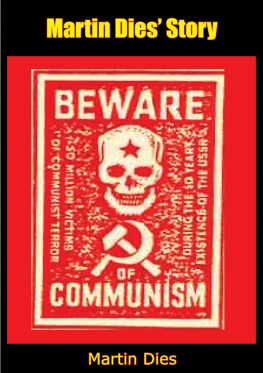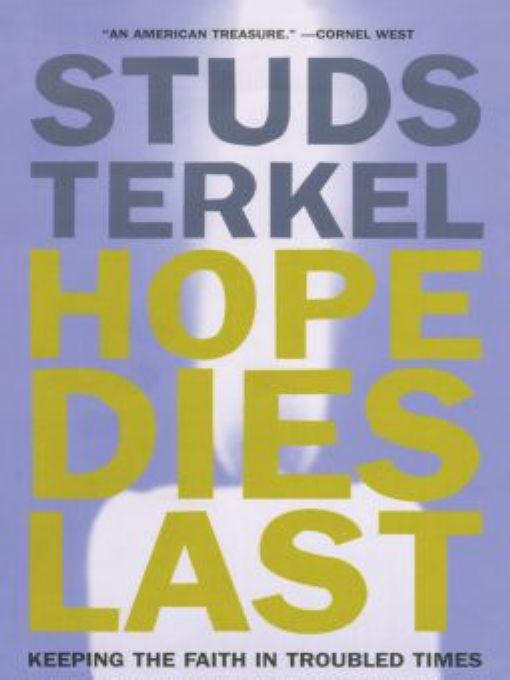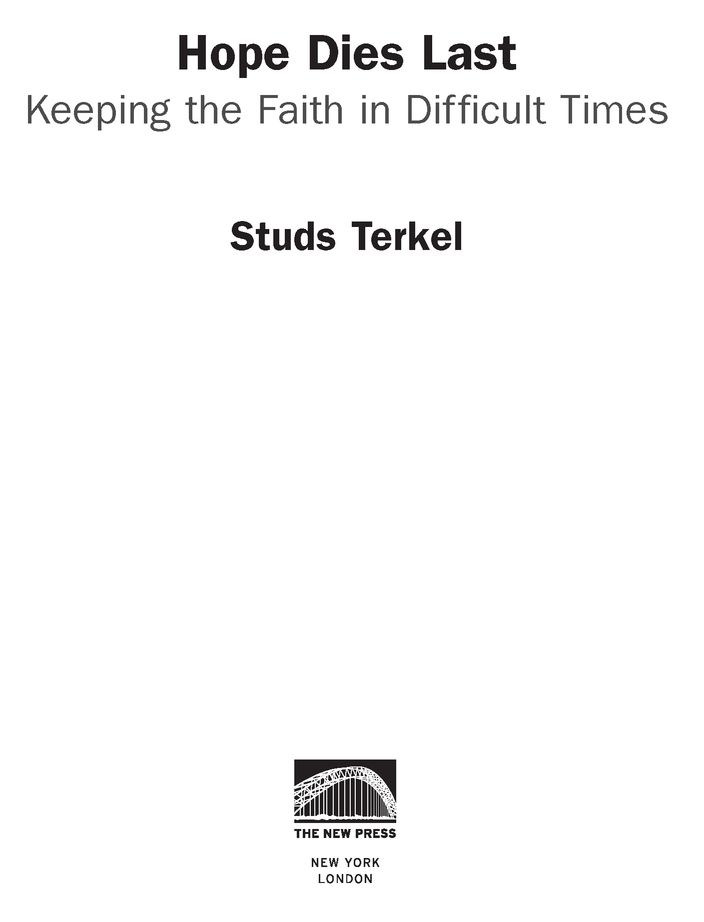Table of Contents
OTHER BOOKS BY STUDS TERKEL
American Dreams
Lost and Found
Division Street
America
Giants of Jazz
The Good War
An Oral History of World War II
Hard Times
An Oral History of the Great Depression
My American Century
The Spectator
Talk About Movies and Plays with the People Who Make Them
Talking to Myself
A Memoir of My Times
Will the Circle Be Unbroken?
Reflections on Death, Rebirth, and Hunger for a Faith
Working
People Talk About What They Do All Day and
How They Feel About What They Do
Remembering Clifford and Virginia Durr
In the Works and Days Hesiod recounts that Zeus sent Pandora to Epimetheus who... was seduced by her beauty and made her his wife. Now, Epimetheus had a large earthenware pot, covered with a lid, which contained all the evils and one good: hope. Pandora had hardly reached Earth when, overcome with curiosity, she lifted the lid of the pot and released all the ills in the world. Only hope, which was at the bottom, was trapped in the pot when Pandora replaced the lid.
Other versions of the legend say that the pot contained not all the worlds ills but every blessing. By opening it carelessly, she let all the good things escape and return to the heavens instead of staying among mankind. That is why men are afflicted with every form of evil: only hope, a poor consolation, is left to them.
The Dictionary of Classical
Mythology, Pierre Grimal
La esperanza muere ltima. Hope dies last.
Jessie de la Cruz
Acknowledgments
RIGHT OFF THE BAT, my thanks to the Big Four: Andr Schiffrin, my publisher for the past thirty-eight years; Tom Engelhardt, the nonpareil of editors; Sydney Lewis, more than a transcriber, an interpreter of indecipherable scrawlings and occasional critic; and Dan Terkel for keeping things moving.
My gratitude to Lonnie Bunch, president of the Chicago Historical Society, where I currently hang my hat, for granting me such latitude; to Usama Alshaibi, the sound engineer of the CHS, for his salvage job on my inept tapings; to Maria Lettiere, Sharon Lancaster, and Sylvia Landsman for help over and beyond the call of duty.
My thanks to Patricia Sullivan for her book Days of Hope: Race and Democracy in the New Deal Era.
As in all my previous works, a salute to the scouts and, especially, to those who have granted me hours of their precious time. I list them in alphabetical order: Fran Ansley, Andrew Bae, Joe Bast, Bruce Bendinger, Adria Bernardi, Father Brendan Curran, Mary Cygan, Father Chuck Dahm, Leon Despres, Ed Flickinger, Darren Fowler, Mary Gaffney, Merle Hansen, Quentin Ikozeo, Thomas Jeffrey, Tony Judge, Mark Larson, Jack Levine, Herschel Ligon, Marian Mc-Partland, Jafar Moradi, Sandra Morales, Stella Nowicki, Hank Oettinger, McKinley Olson, Marie Perez, Crispino Peterino, Barbara Robbins, Steve Robinson, Tom Roeser, Walter Rosenblum, Ed Sadlowski, Florence Scala, Carol Steele, Gloria Steinem, Tish Valva, Tom Walsh, Robb Warden, Haskell Wexler, and Michael Wood.
Introduction
HOPE HAS NEVER TRICKLED DOWN. It has always sprung up. Thats what Jessie de la Cruz meant when she said, I feel theres gonna be a change, but were the ones gonna do it, not the government. With us, theres a saying, La esperanza muere ltima. Hope dies last. You cant lose hope. If you lose hope, you lose everything.
She, a retired farm worker, was recounting the days before Cesar Chavez and his stoop-labor colleagues founded the United Farm Workers (UFW). It was a metaphor for much of the twentieth century.
As we enter the new millennium, hope appears to be an American attribute that has vanished for many, no matter what their class or condition in life. The official word has never been more arrogantly imposed. Passivity, in the face of such a bold, unabashed show of power from above, appears to be the order of the day. But it aint necessarily so.
Letters to the editors of even our more conservative papers indicate something else, something that does not make the six oclock news: a stirring show of discontent in the fields, a growing disbelief in the official word.
This is not a new story. It is a strain that has run through the century past, though not as in extremis as in this one.
During the Great Depression, after the crash came and Varietys headline was Wall Street Lays an Egg, hope was at low tide. There was despair as well as breadlines.
Yet something was happening from below. True, the New Deal of President Franklin D. Roosevelt was endowed with enlightened men and women who recognized the needs of the many. But that alone didnt turn the trick of transforming despair into hope.
There was always pressure from below: from beleaguered and embattled farmers coming out of the woods; from big-city neighborhood alliances, defying evicting bailiffs; from a threatened march on Washington by black trade unionists, leading to the passage of the Fair Employment Practices Act; and even from some forgotten man who swung from a chandelier during a Waldorf-Astoria dinner of baffled industrialists, shouting Social security! It was the very first time I had ever heard that phrase. Naturally, he was subjected to psychiatric care. Of course, that loner didnt cause social security to come to be, but he did help it along. At least I knew what it meant when, during the New Deal, it came to pass.
These troublemakers were, by definition, activists (active: 1. In action, moving. 2. Causing or initiating change. 3. Engaging, contributing, participating). They felt that what they did counted and that they themselves counted. Thus it was that out of the Depression, and during it, hope was springing forth.
Shortly after World War II came prosperity; there was a chicken in every pot, and a car in every garage, and more, much more. But along with it came the cold war, the witch-hunt. And silence.
Those who spoke out on behalf of those still dispossessed more than paid their dues. Hope for that more equitable society took an awful beating during these bleak times.
And yet, seemingly out of nowhere, came the 60s, led by students from all sorts of campuses. A great many of them knew nothing of the 30s, yet there they were. Along with African Americans, rediscovering a lost legacy, they helped end a maladventure in Southeast Asia as well as play a role in the advancement of civil rights. It was a time of tumultuousness and hope.
So we come to today, three years into the new millennium. As Sean OCaseys Captain Boyle, gloriously drunk, mumbled to his buddy Joxer, The wur-r-rld is in a terrible state of chassis. The chaos, and its accompanying terrors afoot, is in no small way attributed to the wantonness of our appointed chieftain and his armchair warriors.
It would be manifestly unfair to blame the troubles wholly on one administration. It has been the dark dividend of all our adventures since the cold war. But now, with the worlds hope, the United Nations, being constantly humiliated by our public servants, we are seeing enemies everywhere, even among our former allies. Thomas Paines vision of the American is being profaned. What he wrote in 1791 is on the button in 2003: Freedom had been hunted round the globe; reason was considered as rebellion; and the slavery of fear had made men afraid to think. But such is the irresistible nature of truth that all it asks, and all it wants, is the liberty of appearing.... In such a situation, man becomes what he ought. He sees his species, not with the inhuman idea of a natural enemy, but as a kindred.





